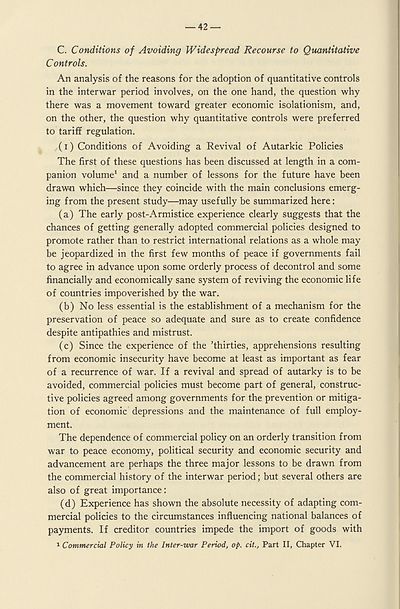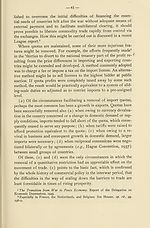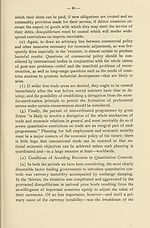Download files
Complete book:
Individual page:
Thumbnail gallery: Grid view | List view

— 42
C. Conditions of Avoiding Widespread Recourse to Quantitative
Controls.
An analysis of the reasons for the adoption of quantitative controls
in the interwar period involves, on the one hand, the question why
there was a movement toward greater economic isolationism, and,
on the other, the question why quantitative controls were preferred
to tariff regulation.
,(i) Conditions of Avoiding a Revival of Autarkic Policies
The first of these questions has been discussed at length in a com¬
panion volume1 and a number of lessons for the future have been
drawn which—since they coincide with the main conclusions emerg¬
ing from the present study—may usefully be summarized here:
(a) The early post-Armistice experience clearly suggests that the
chances of getting generally adopted commercial policies designed to
promote rather than to restrict international relations as a whole may
be jeopardized in the first few months of peace if governments fail
to agree in advance upon some orderly process of decontrol and some
financially and economically sane system of reviving the economic life
of countries impoverished by the war.
(b) No less essential is the establishment of a mechanism for the
preservation of peace so adequate and sure as to create confidence
despite antipathies and mistrust.
(c) Since the experience of the ’thirties, apprehensions resulting
from economic insecurity have become at least as important as fear
of a recurrence of war. If a revival and spread of autarky is to be
avoided, commercial policies must become part of general, construc¬
tive policies agreed among governments for the prevention or mitiga¬
tion of economic depressions and the maintenance of full employ¬
ment.
The dependence of commercial policy on an orderly transition from
war to peace economy, political security and economic security and
advancement are perhaps the three major lessons to be drawn from
the commercial history of the interwar period; but several others are
also of great importance:
(d) Experience has shown the absolute necessity of adapting com¬
mercial policies to the circumstances influencing national balances of
payments. If creditor countries impede the import of goods with
1 Commercial Policy in the Inter-war Period, op. cit.. Part II, Chapter VI.
C. Conditions of Avoiding Widespread Recourse to Quantitative
Controls.
An analysis of the reasons for the adoption of quantitative controls
in the interwar period involves, on the one hand, the question why
there was a movement toward greater economic isolationism, and,
on the other, the question why quantitative controls were preferred
to tariff regulation.
,(i) Conditions of Avoiding a Revival of Autarkic Policies
The first of these questions has been discussed at length in a com¬
panion volume1 and a number of lessons for the future have been
drawn which—since they coincide with the main conclusions emerg¬
ing from the present study—may usefully be summarized here:
(a) The early post-Armistice experience clearly suggests that the
chances of getting generally adopted commercial policies designed to
promote rather than to restrict international relations as a whole may
be jeopardized in the first few months of peace if governments fail
to agree in advance upon some orderly process of decontrol and some
financially and economically sane system of reviving the economic life
of countries impoverished by the war.
(b) No less essential is the establishment of a mechanism for the
preservation of peace so adequate and sure as to create confidence
despite antipathies and mistrust.
(c) Since the experience of the ’thirties, apprehensions resulting
from economic insecurity have become at least as important as fear
of a recurrence of war. If a revival and spread of autarky is to be
avoided, commercial policies must become part of general, construc¬
tive policies agreed among governments for the prevention or mitiga¬
tion of economic depressions and the maintenance of full employ¬
ment.
The dependence of commercial policy on an orderly transition from
war to peace economy, political security and economic security and
advancement are perhaps the three major lessons to be drawn from
the commercial history of the interwar period; but several others are
also of great importance:
(d) Experience has shown the absolute necessity of adapting com¬
mercial policies to the circumstances influencing national balances of
payments. If creditor countries impede the import of goods with
1 Commercial Policy in the Inter-war Period, op. cit.. Part II, Chapter VI.
Set display mode to:
![]() Universal Viewer |
Universal Viewer | ![]() Mirador |
Large image | Transcription
Mirador |
Large image | Transcription
Images and transcriptions on this page, including medium image downloads, may be used under the Creative Commons Attribution 4.0 International Licence unless otherwise stated. ![]()
| League of Nations > Economic and financial section > Quantitative trade controls > (44) |
|---|
| Permanent URL | https://digital.nls.uk/190588565 |
|---|
| Shelfmark | LN.II |
|---|
| Description | Over 1,200 documents from the non-political organs of the League of Nations that dealt with health, disarmament, economic and financial matters for the duration of the League (1919-1945). Also online are statistical bulletins, essential facts, and an overview of the League by the first Secretary General, Sir Eric Drummond. These items are part of the Official Publications collection at the National Library of Scotland. |
|---|---|
| Additional NLS resources: |
|

